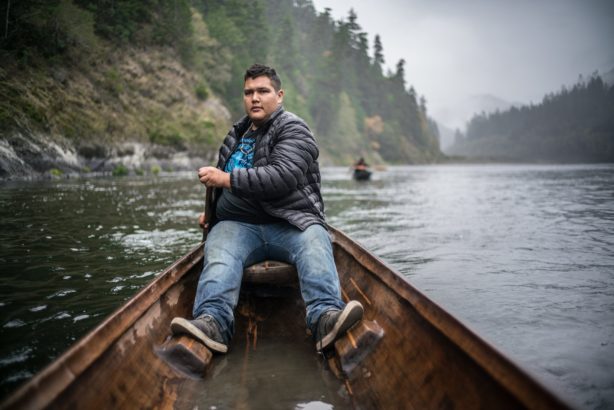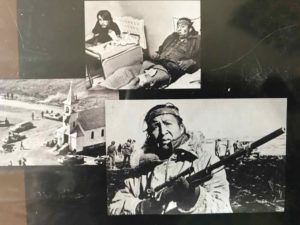
Watch films at Roxie Virtual Cinema:
https://www.roxie.com/
Indigenous Self-Determination in The Time of COVID-19
Co-Presented by and proceeds to benefit the Oakland Intertribal Friendship House!
In honor of Indigenous Peoples Day and the 50th Anniversary of the occupation of Alcatraz, A.I.M. West presents two new and extraordinary feature films and a program of shorts, all of which revolve around the theme of Indigenous Self-Determination in The Time of the COVID-19 Pandemic.
GATHER
“Critic’s Pick… The film wonderfully weaves personal stories with archival footage that contextualizes the continued violence against Native Americans.”- NY Times.

Gather is an intimate portrait of the growing movement amongst Native Americans to reclaim their spiritual, political and cultural identities through food sovereignty, while battling the trauma of centuries of genocide.
Gather follows Nephi Craig, a chef from the White Mountain Apache Nation (Arizona), opening an indigenous café as a nutritional recovery clinic; Elsie Dubray, a young scientist from the Cheyenne River Sioux Nation (South Dakota), conducting landmark studies on bison; and the Ancestral Guard, a group of environmental activists from the Yurok Nation (Northern California), trying to save the Klamath river.
Written and directed by Sanjay Rawal. USA. 2020. 74 minutes.

RENEGADE
“Kai Denison, a City Native American, has had a troubled life and years of abuse and depression. He feels like as if everyone around him has a purpose except for him, until he begins having strange dreams about his hometown being destroyed by a mysterious figure carrying a virus. With the help of an old medicine man and a gift from a supernatural presence, Kai must change the future and become not only the warrior for his city, but for the world.”
Director | Cinematographer | Editor: Luis Montoya and Cha-tah. USA. 27 mins.

“Kai Denison, a City Native American, has had a troubled life and years of abuse and depression. He feels like as if everyone around him has a purpose except for him, until he begins having strange dreams about his hometown being destroyed by a mysterious figure carrying a virus. With the help of an old medicine man and a gift from a supernatural presence, Kai must change the future and become not only the warrior for his city, but for the world.”
Director | Cinematographer | Editor: Luis Montoya and Cha-tah. USA. 27 mins.

ÔTÊNAW
A film documenting the oral storytelling of Dwayne Donald, an educator from Treaty 6, Edmonton Canada. Drawing from nêhiyawak philosophies, he speaks about the multilayered histories of Indigenous peoples’ presence both within and around amiskwacîwâskahikan, or what has come to be known as the city of Edmonton.
Directed by Conor McNally. Canada. In English & Cree. 40 mins.

A film documenting the oral storytelling of Dwayne Donald, an educator from Treaty 6, Edmonton Canada. Drawing from nêhiyawak philosophies, he speaks about the multilayered histories of Indigenous peoples’ presence both within and around amiskwacîwâskahikan, or what has come to be known as the city of Edmonton.
Directed by Conor McNally. Canada. In English & Cree. 40 mins.

A TATTOO ON MY HEART
A Tattoo On My Heart: The Warriors of Wounded Knee commemorates the 30th anniversary of the dramatic siege of 1973, through the words of the American Indian men and women who struggled for survival inside the bunkers and ravines of South Dakota’s Pine Ridge Reservation. The film uses contemporary interviews and historical archival images to tell the story of the historic standoff between American Indian Movement activist and federal agents on South Dakota’s Pine Ridge Reservation.
Director/Writer: Charles Abourezk, Brett Lawlor. 2005 Run Time: 56 minutes
A Tattoo On My Heart: The Warriors of Wounded Knee commemorates the 30th anniversary of the dramatic siege of 1973, through the words of the American Indian men and women who struggled for survival inside the bunkers and ravines of South Dakota’s Pine Ridge Reservation. The film uses contemporary interviews and historical archival images to tell the story of the historic standoff between American Indian Movement activist and federal agents on South Dakota’s Pine Ridge Reservation.
Director/Writer: Charles Abourezk, Brett Lawlor. 2005 Run Time: 56 minutes
THE DOCTRINE OF DISCOVERY, UNMASKING THE DOMINATION CODE
Papal Bulls of the 15th century gave Christian explorers the right to claim lands they “discovered” and lay claim to those lands for their Christian Monarchs. Any land that was not inhabited by Christians was available to be “discovered”, claimed, and exploited. If the “pagan” inhabitants could be converted, they might be spared. If not, they could be enslaved or killed. The Discovery Doctrine is a concept of public international law expounded by the United States Supreme Court in a series of decisions, initially in Johnson v. M’Intosh in 1823. The doctrine was Chief Justice John Marshall’s explanation of the way in which colonial powers laid claim to newly discovered lands during the Age of Discovery. Under it, title to newly discovered lands lay with the government whose subjects discovered new territory. The doctrine has been primarily used to support decisions invalidating or ignoring aboriginal possession of land in favor of colonial or post-colonial governments. John Marshall, who is most credited with describing the doctrine, did not voice wholehearted support of the doctrine even while using it to justify judicial decisions. He pointed to the doctrine as simple fact, looking at the possession-takings which had been supported by it as things which had occurred and had to be recognized. The supposedly inferior character of native cultures was a reason for the doctrine having been used, but whether or not that was justified was not relevant for Marshall. This Doctrine governs United States Indian Law today and has been cited as recently as 2005 in the decision City Of Sherrill V. Oneida Indian Nation Of N.Y.
Directed by Sheldon Wolfchild. Based on the book, ‘Pagans in the Promised Land’ by co-producer Steven Newcomb. 61 mins. Narrated by Buffy Saint Marie.
No comments:
Post a Comment